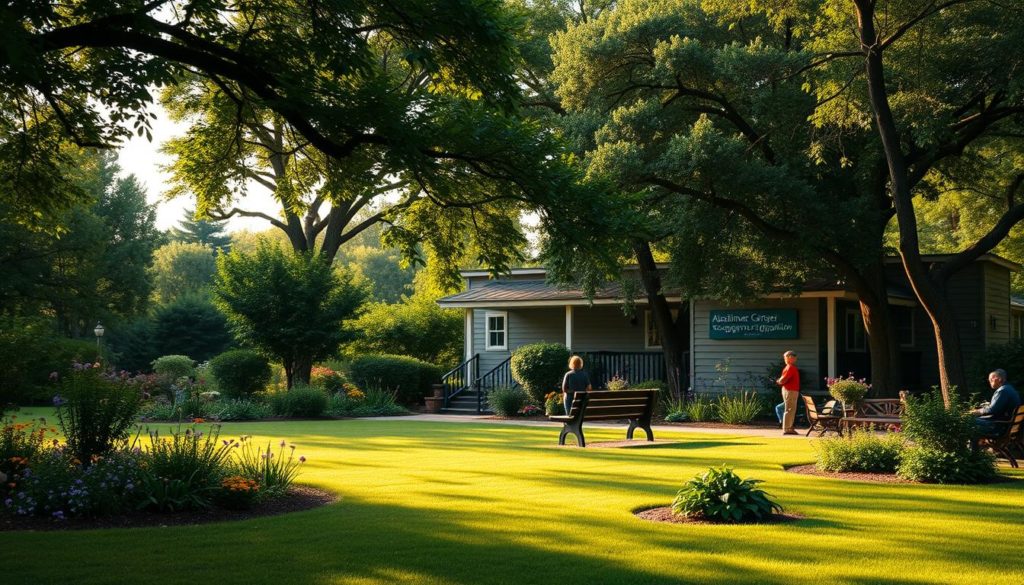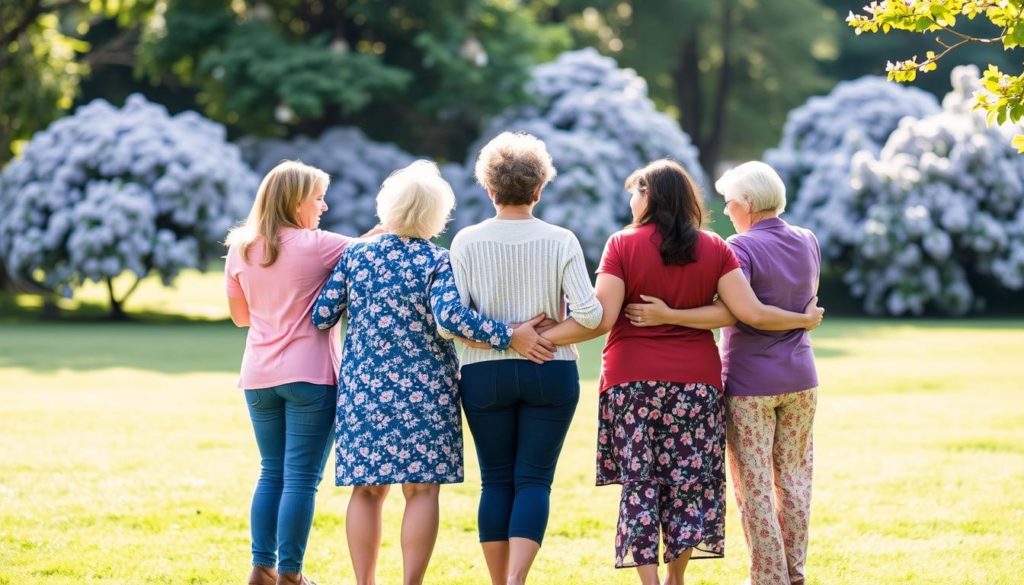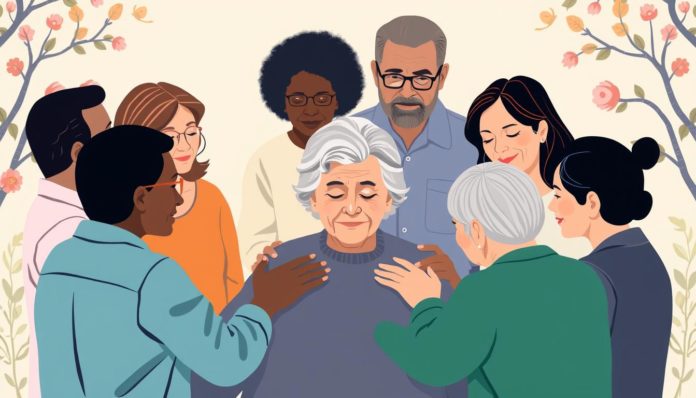Did you know that over 16 million Americans volunteer to care for those with Alzheimer’s and other dementias? This fact highlights not just a number but the deep impact on the health and well-being of caregivers. It also affects their ability to work productively.
The increase in Alzheimer’s cases means a growing need for resources for dementia caregivers. Supporting these caregivers is more important than ever.
Communities in the United States face the challenge of better caregiver education and making services easy to access. There’s also a goal to make care more joined-up. Better support for Alzheimer’s caregivers leads to fair chances and thorough care for everyone.
To make changes, public health experts can use resources like the “Promoting Caregiving Across the Full Community: The Role for Public Health Strategists Action Brief.” They can also use the “Supporting Caregivers Issue Map.” These tools can greatly enhance how caregivers are supported.
The Growing Need for Alzheimer Caregiver Support
The rise of Alzheimer’s disease highlights the importance of Alzheimer Caregiver Organizations. They play a key role in backing caregivers. With the growing need for care, strong support systems are crucial.

Impact on Caregiver Health
Caregivers for Alzheimer’s patients face big emotional and physical hurdles. Handling day-to-day tasks and intensive care takes a toll on their health. It’s crucial to look after the caregiver health impact for their long-term ability to provide care.
Community Burden and Response
Communities are pressured to supply enough resources and support for dementia care. The community response to dementia means more public awareness, better service access, and fair support distribution. This ensures caregivers have the help they need on this tough journey.
Key Alzheimer Caregiver Organizations in the US
In the US, key organizations help Alzheimer caregivers a lot. They offer many services like learning opportunities, support circles, breaks, help with transport, and teaching caregivers. This support is vital for those caring for people with dementia.

National vs. Local Organizations
National and local groups for dementia caregiving differ greatly. National groups reach more people and have lots of resources. They offer big programs and do a lot of research. Meanwhile, local groups give support right in the community. They make caregivers feel part of a close group.
Services Offered by Leading Organizations
Top organizations give many services designed for Alzheimer caregivers. Services range from learning sessions and support circles to care breaks and travel help. Big national groups like the Alzheimer’s Association and the Alzheimer’s Foundation of America help a lot. They give resources and support everywhere. Local caregiver groups provide specific help for community needs.
| Organization | Type | Key Services |
|---|---|---|
| Alzheimer’s Association | National | Education, research, support groups, hotline |
| Alzheimer’s Foundation of America | National | Respite care, training, educational resources |
| Local Dementia Caregiver Associations | Local | Community support, transportation aid, hands-on assistance |
Nonprofit Alzheimer Support Networks
Nonprofit organizations focus on Alzheimer’s support. They are key in creating a strong caregiver network. These groups provide vital resources, communities, and tools. They help meet caregivers’ unique needs.
- Alzheimer’s Association: This group leads in Alzheimer support. It gives educational materials, support groups, and a 24/7 helpline.
- Alzheimer’s Foundation of America: Known for extensive caregiver support. This includes therapeutic and respite care services.
- National Institute on Aging: Offers lots of research-based info and resources for caregivers.
“Nonprofit Alzheimer support is crucial for the caregiving journey. It provides key information and connections.” — Alzheimer’s Association spokesperson
Here’s a comparison of the services these organizations offer:
| Organization | Support Services | Special Programs |
|---|---|---|
| Alzheimer’s Association | 24/7 Helpline, Support Groups | Safe Return Program, Educational Workshops |
| Alzheimer’s Foundation of America | Therapeutic Programs, Counseling | Art Therapy, Music Therapy |
| National Institute on Aging | Research-Based Information, Online Resources | Caregiver Training Modules |
These nonprofit Alzheimer support networks are more than resources. They are caring communities. They offer huge help and understanding for Alzheimer caregivers.
Caregiving Tips for Alzheimer’s Caregivers
Caring for someone with Alzheimer’s is both rewarding and challenging. Effective tips can make the journey easier. It’s also crucial to get support for the caregivers.
Daily Care Strategies
Setting a regular routine helps a lot. It brings stability and reduces confusion for those with Alzheimer’s. Every day, try to:
- Consistent meal times
- Regular exercise or walks
- Structured recreational activities
- Dressing and grooming tasks at the same time each day
Using these strategies creates a supportive environment. It helps the person with Alzheimer’s feel more at ease. Support networks offer extra advice and resources.
Emotional and Mental Health Support
It’s important to look after your own emotional health, too. Support groups provide a place to share and get advice. Keep these tips in mind:
- Regular Breaks: Take breaks to prevent burnout.
- Seek Professional Help: If stress becomes too much, get professional help.
- Join Support Groups: Connect with others by joining caregiver groups.
- Mindfulness and Relaxation: Try techniques like meditation to relax and find peace.
Balancing caregiving and personal health is key. The right tips and support make it possible. Caregivers get better at caring for themselves and their loved ones.
Caregiver Support Groups and Their Benefits
Caregivers for Alzheimer’s patients face big emotional and physical challenges. Getting support can really help their health and caregiving abilities. Caregiver support groups are precious. They offer a place to share stories, get better at solving problems, and receive encouragement. These groups are accessible both face-to-face and through virtual Alzheimer support meetings.
Virtual vs. In-Person Support Groups
Choosing between online and in-person groups is personal. It depends on what each person likes better and their situation. Virtual Alzheimer support meetings are flexible. You can join from anywhere, which is great for those with not much free time or who can’t travel easily. But, in-person groups offer a close and interactive setting. This is good for those who like meeting others face-to-face.
Specialized Support Groups
There are many different caregiver support groups to meet different needs. For example, there are groups just for those who care for adult children, those who care for people with Alzheimer’s that started young, and male caregivers. Each group focuses on the unique challenges those caregivers face. Being in these groups helps caregivers meet others who truly understand what they are going through.
You can find these specialized groups all over the US. They are usually run by trained leaders to make sure they are helpful and safe. Whether you choose online or face-to-face groups, caregivers can find the right help and community support through the Alzheimer’s Association support groups.
Examples of State-Level Support Initiatives
As more people live with Alzheimer’s, state initiatives become key. States have started programs that help dementia caregivers a lot. They show us local ways to handle a national issue.
Success Stories from States
California, New York, and Texas have created programs to help Alzheimer caregivers. California’s disease roadmap guides caregivers through dementia stages. In New York, memory care navigator programs give families the help they need. Texas offers training programs that teach caregivers how to deal with tough behavior.
How Other States Can Adapt Similar Programs
Other states can learn from these successes to address their challenges. Understanding these programs helps tailor them to local needs. Working with healthcare and community groups is crucial for offering strong support to caregivers.
Dementia Caregiver Associations and Their Roles
Dementia caregiver associations offer crucial support. They help those looking after individuals with dementia. These groups give guidance, training, and help to ease the caregiver’s journey.
They provide a range of Alzheimer caregiver resources. From workshops to care options, they aim to reduce caregiving stress. This improves care quality for those with Alzheimer’s disease.
These associations also create support groups and counselling services. It offers both emotional support and advice on caregiving. Through these, caregivers find community and understanding.
| Association | Key Services | Contact Information |
|---|---|---|
| Alzheimer’s Association | Support Groups, Educational Resources, 24/7 Helpline | 1-800-272-3900 |
| Family Caregiver Alliance | Caregiver Support, Counseling, Resource Centers | 1-800-445-8106 |
| AARP Caregiving Resource Center | Workshops, Online Resources, Care Guides | 1-877-333-5885 |
With the help of these associations, caregivers are better equipped. They can manage the care of loved ones with dementia more effectively. Education and support from peers greatly improve the caregiving experience and well-being.
Importance of Caregiver Education Programs
Education is key in Alzheimer’s care. It boosts care quality. Caregiver education programs give essential skills for daily challenges.
They help understand Alzheimer’s better. This empowers caregivers, improving Alzheimer’s care.
Available Training and Resources
Many organizations offer training for caregivers. The Alzheimer’s Association and the Family Caregiver Alliance are examples. They have online courses and workshops.
Topics include managing behavior and medicine use. These programs give caregivers tools and strategies.
Impact on Care Quality
Education improves Alzheimer’s care. Informed caregivers handle the disease better. They provide compassionate care.
Studies show these programs help caregivers and those with Alzheimer’s. They reduce stress and burnout. Good care comes from using what caregivers learn.
FAQ
What types of assistance can Alzheimer caregivers find from organizations?
Organizations for Alzheimer caregivers offer lots of help. They provide education, support groups, and respite care. Caregivers can also get help with transportation and training.
How does caregiving for someone with Alzheimer’s impact the caregiver’s health?
Caring for someone with dementia is tough. It greatly increases the caregiver’s risk of stress. This stress affects them both physically and emotionally.
What are communities doing to support Alzheimer caregivers?
Communities are stepping up to help caregivers. They’re raising awareness and making services better. They’re also working to give everyone equal access to resources.
What is the difference between national and local Alzheimer caregiver organizations?
National organizations have a lot of resources and big programs. Local groups focus on what their specific community needs. They offer more personal support.
What types of services do leading Alzheimer caregiver organizations provide?
Leading organizations help a lot. They give education, form support groups, and offer respite services. They also help with transportation and training for caregivers.
Can nonprofit Alzheimer support networks help caregivers?
Yes, nonprofit networks are great for caregivers. They provide tools, resources, and support groups. All are specially designed for Alzheimer caregivers’ needs.
What daily care strategies can assist Alzheimer caregivers?
For daily care, routines are key. Use aids for communication and safety measures. These strategies make caregiving simpler and less stressful.
How can Alzheimer caregivers maintain their emotional and mental health?
Caregivers should join support groups and take breaks. Practicing self-care is also vital. These steps help keep their mental and emotional health in check.
What are the benefits of caregiver support groups?
Support groups offer a space to share experiences and strategies. They provide emotional support. This helps caregivers feel supported and less alone.
Should caregivers choose virtual or in-person support groups?
It’s up to personal preference. Virtual groups are more flexible. In-person groups allow for real-life interaction.
Are there specialized support groups for different stages of Alzheimer’s?
Yes, there are. Groups are available for children, early-onset, and early-stage Alzheimer’s. They meet the needs for different stages of the disease.
What successful state-level support initiatives exist for Alzheimer caregivers?
There are excellent initiatives. These include special training, roadmaps for the disease, and care navigator programs. They all support caregivers comprehensively.
How can other states adapt successful dementia caregiving programs?
Other states can learn from these models. They should work with health strategists. Then, they can tailor programs to fit their community needs.
What roles do dementia caregiver associations play?
These associations provide a lot of help. They offer training, resources, and support for caregivers and those with dementia. They make navigating the illness easier.
Why are caregiver education programs important?
These programs are crucial. They improve care quality by giving caregivers the skills and knowledge they need. This allows for more effective and compassionate care.
What training and resources are available for Alzheimer caregivers?
Caregivers can access online courses, workshops, and printed materials. Various organizations provide these resources. They’re all dedicated to Alzheimer caregiver education.
How do caregiver education programs impact care quality?
Education programs make a big difference. They empower caregivers with knowledge and skills. This boosts confidence in managing care effectively and with compassion.


